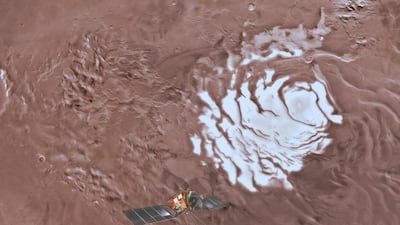The discovery of liquid water on Mars has revived the thrilling prospect of finding alien life on the Red Planet.
Using radar to probe beneath the south pole of the planet, the European Space Agency’s Mars Express orbiter has detected evidence for a 20 kilometre stretch of water some 1.5 kilometres below the surface.
It may be only a metre or so deep, but this subterranean lake is already being talked of as a potential home for Martians. Not the multi-armed marauders of science fiction, but more likely single-celled microbes.
The discovery comes hard on the heels of the announcement by scientists at Nasa that they too have found evidence pointing to the existence of Martian life.
In the early 2000s, astronomers found trace amounts of methane in the Martian atmosphere. Its existence sparked excitement because the gas cannot last more than a few years before being torn apart of the sun’s intense ultraviolet radiation. So something on Mars must be replenishing the stuff – and one potential source is bacteria.
_________________
Read more:
First lake of liquid water discovered on Mars
Life on Mars: A workshop in Dubai shows how humans might make the red planet habitable
UAE best place to see longest lunar eclipse of 21st century, say astronomers
_________________
Now Nasa’s Curiosity rover, which has been trundling around a large crater on Mars looking for signs of life, has found that the levels of methane rise and fall in a natural cycle, being much greater during the Martian summer.
While far from conclusive evidence of a biological origin, this has ruled out some of the more ho-hum chemical explanations.
Last month, Nasa scientists also announced that Curiosity had found organic molecules in samples extracted from the crater it is sitting in – thought once to have been filled with water.
According to the scientists, the molecules are consistent with the lake holding all the ingredients necessary for life.
So are we on the brink of discovering that we are not alone in the universe?
Cynics will point out that space agencies have good reason for talking up even the most tenuous evidence for life on Mars. In the past, it has proved effective in getting politicians to loosen the purse-strings and fund new missions.
But in fairness there are no sterner critics of such claims than scientists themselves.
And they have had plenty of opportunities to exercise scepticism over the years.
Astronomers were debating evidence for the existence of water on Mars as long ago as the 1890s. Some even claimed to have observed networks of canals on the planet’s surface, built by Martians to irrigate their arid home.
Investigations by sceptical scientists later revealed the “canals” to be optical illusions.
In the mid-1970s, Nasa’s Viking probes soft-landed on Mars, and set about testing soil samples for signs of life. Some of the tests gave results consistent with the existence of microbial life in the samples. However, studies later showed that lifeless chemical reactions could produce the same outcome.
In perhaps the most dramatic claim yet made, Nasa scientists claimed in July 1996 to have found fossilised worm-like objects in meteorites that had travelled from Mars and landed in Antarctica. Again, subsequent research showed that the “fossils” could be explained without invoking any form of life.
While intriguing, the latest discoveries from the Red Planet are likely to prove no more conclusive. The “lake” is known to be incredibly cold, with a temperature of around minus 68 Celsius. To keep it from freezing over, it’s probably rich in compounds found on Mars known as perchlorates. Combined with the temperature, these are hardly conducive to microbial life.
As for the organic molecules found by Curiosity, they may be nothing more than that: lifeless collections of atoms.
These new discoveries are undoubtedly intriguing. But in the quest for life on other worlds, there’s a scientific maxim worth remembering: extraordinary claims require extraordinary evidence. And that remains as elusive as ever.
Robert Matthews is Visiting Professor of Science at Aston University, Birmingham, UK

